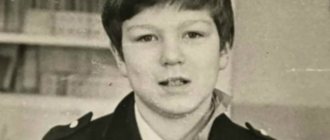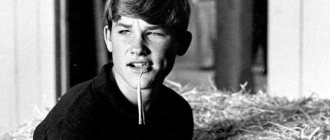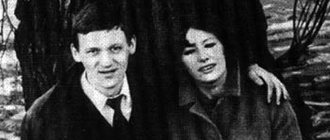Biography
Dmitry Astrakhan was born in the mid-fifties in Leningrad into a family of historians - Hanan Astrakhan and Susanna Manevich, immigrants from Belarus. He was the youngest, fifth child in the family. A childhood passion for mathematics led the future director first to the famous physics and mathematics school on Vasilievsky Island, and then to the Leningrad Electrotechnical Institute named after Lenin. However, as it soon turned out, exact sciences were not Astrakhan’s only passion.
Dmitry changed several higher educational institutions until he ended up at the Leningrad State Institute of Theater, Music and Cinematography. Astrakhan completed his studies there, in the workshop of A.A.Muzil, in 1982, receiving a diploma as a stage director. His graduation work was supposed to be the production of a play at the Pushkin Theater, however, according to the director himself, he was never allowed to stage the play because of his Jewish nationality.
Childhood and family of Dmitry Astrakhan
The future filmmaker was born into an intelligent Jewish family from the Northern capital. Dima became the fifth child in the family. His parents, historians by training, studied together at the same faculty.
Dmitry Astrakhan was born into a large Jewish family. His father, Professor Hanan Markovich, taught the history of the CPSU at the Institute of Railway Transport Engineers. Mom, Susanna Markovna (nee Manevich), was a bibliographer and worked at the public library named after M.E. Saltykov-Shchedrin. She had a brother, Alexander Manevich, a Stalin Prize laureate, author of the opera “Anna Karenina”, the cantata “For Peace!”, “Five Jewish Folk Songs” and other musical works.
Both parents came from Belarus: dad came from Borisov, mom from Gomel. His father’s relatives were shot by the Nazis, only his mother and Dmitry’s grandmother survived, who was hidden from the occupation authorities by Belarusian villagers throughout the war. The maternal grandfather fell into the category of so-called “disenfranchised”, who did not have the right to vote, so the family also had to hide all information about him for a long time. His daughter, the Komsomol organizer of the school, was especially tormented by remorse about this. Dmitry's dad died at the age of 70. In 2001, his mother also died in Detroit, USA.
Their family was famous for its large number of friends and relatives. On holidays, at least fifty people gathered around the table in their house.
Dmitry Astrakhan did not immediately find his calling. At school, Dmitry Astrakhan studied well, enjoyed classical wrestling, but did not last long at the music school. For the last two school years he was a student at a specialized mathematical educational institution. Then he entered the Electrotechnical Institute, where benefits were provided to applicant athletes. Later, trying to find himself, he transferred to a financial and economic university, to the faculty of cybernetics.
Theater
After graduating from GITMiK, Dmitry Astrakhan became the director of the Sverdlovsk Theater for Young Spectators. At first he was offered the position of assistant director in Leningrad itself, but a little later the prospect of the Sverdlovsk Youth Theater appeared, and Astrakhan chose Sverdlovsk, where he headed the theater until 1987.
With a break to serve in the army, namely in naval aviation, Dmitry continued to stage plays in various theaters across the country, interning with Georgy Aleksandrovich Tovstonogov in Leningrad.
From 1991 to 1995, Dmitry Astrakhan was the artistic director of the Akimov Comedy Theater in St. Petersburg. Over the fifteen years of work at the theater he staged more than 40 performances. The play “The Daring Fellow - the Pride of the West” by Irish playwright D. Syng was staged by the director several times.
Creative career of Dmitry Astrakhan
One day Dima stopped by a rehearsal for an amateur performance, where he received an offer to read poetry and, unexpectedly, the main role in the play. After 2 months, he played so convincingly in the final scene of the play that he made the audience cry. The premiere was attended by the head of the local Opera and Ballet Theater, Roman Tikhomirov, who advised the 19-year-old boy to stop searching for his destiny, assuring him that he was a born actor. After a call to Georgy Tovstonogov and Alexander Murzil, Dmitry became a student at the directing department of the Institute of Theatre, Music and Cinematography.
Dmitry Astrakhan graduated from the Institute of Theater, Music and Cinematography. As Dmitry later noted in an interview, he felt so comfortable and organic in this educational institution that he was amazed when he was given a scholarship. In his opinion, paying to study at a technical university is quite understandable - there you had to make an effort, study a lot of complex and uninteresting things. At the theater institute, the learning process was filled with reading Shakespeare, Dostoevsky, thinking about life and love, and was associated with immersion in an incredible atmosphere of magic, goodness, justice - isn’t it surprising that they also pay for such a pastime?
In 1981, after a series of unsuccessful attempts to stage a graduation performance in one of the city’s theaters on the Neva, the young director enlisted the support of his friend, who had graduated from their alma mater earlier and worked at the Sverdlovsk Drama Theater. He went to the capital of the Urals and staged a play for the 19th Komsomol Congress. The production turned out to be bright, intriguing and poignant - after the premiere he was nominated for the Lenin Komsomol Prize. Next came work as the chief director of the Youth Theater, service in the navy in the Far East and a return to Sverdlovsk.
Many theaters invited director Dmitry Astrakhan to join them. Having staged several plays, the devoted servant of Melpomene received an invitation to an internship from the master of directing himself, Tovstonogov from the Leningrad Bolshoi Drama Theater. Alexei German, who headed the Debut association, also liked the manner of staging Astrakhan’s plays. He noted that Dmitry has the ability to easily talk about serious things, so he invited him to make a movie.
Movie
Dmitry Astrakhan made his film debut as a director in 1988, filming together with Nikita Khubov the melodrama “Fatal Mistake” based on the play by Mikhail Roshchin.
From 1990 to 1991, Astrakhan worked on the film “Get Out!” about Jewish pogroms in Russia at the beginning of the 20th century. As filming progressed, the film turned from a short film into a full-length film. Here Dmitry acted as a screenwriter, director and starred in the episode. Subsequently, the director continued to appear in episodic roles in his films. In 1993, the psychological melodrama “You Are My Only One” with Alexander Zbruev and Marina Neyolova was released. Dmitry Astrakhan played a boxing judge. In 1995 - the comedy “Everything will be fine”, and two years later - the tragedy “From Hell to Hell”. Then there was the series “Waiting Room” and many other works. In 2011, for the role of administrator Leonid Friedman in the film “Vysotsky. Thank you for being alive.” Astrakhan received the Nika Award and was also among the nominees for the Golden Eagle Award.
In 2013, the director’s filmography was replenished with roles in the films “Once Upon a Time,” “The Invisibles,” and “Parallel Life.”
Movies
His debut as a film director was the film “Fatal Mistake.” The film was shown on one of the TV channels in Yekaterinburg. In 1990, Dmitry began filming the short film “Get Out” based on his own script. A year later it was released in full-length version. The filming required 1 million rubles, a cosmic sum at that time. Astrakhan, himself a Jew by nationality, who shot a film about Jewish pogroms in Russia at the beginning of the 20th century, turned for help to the Jewish Cultural Center with Boris Korchevnikov - Dmitry Astrakhan
The director later recalled that he was the first of his colleagues to bring sponsorship money to the studio. “Get Out” received the main prize at Kinotavr and was nominated for an Oscar from Russia. Dmitry made another film about interethnic enmity - “From Hell to Hell.” The leading actress, Alla Klyuka, was awarded the Kinotavr Prize and a Golden Ram nomination as best actress.
In 1993, the premiere of another work by the director took place. The melodrama “You are the only one I have” with Alexander Zbruev and Marina Neyolova was filmed according to all the laws of this genre. Critics called the film overly emotional, which did not stop it from collecting a scattering of awards at Russian and international film forums.
Trailer for the film “Love Without Rules”
In 1995, Dmitry Astrakhan filmed the comedy “Everything will be fine” with Anatoly Zhuravlev, which received the Grand Prix of the “Love is Folly” festival. Then there was the series “Waiting Room” and the crime film “Contract with Death”, which also did not go without awards. After the release of the musical film “Crossroads,” fans of Andrei Makarevich’s work received another hit performed by him – the soundtrack of the same name.
In 2001, Dmitry presented the audience with the melodrama “Give Me Moonlight” with Natalya Andreichenko and Olesya Sudzilovskaya. For the leading actor Nikolai Eremenko Jr., this is one of the last projects in his life.
Trailer for the film "Kids"
The director has been working with screenwriter Oleg Danilov for many years. In 2012, the creative tandem presented the fairy tale “Children”. The action of the film takes place in an orphanage, whose pupils organize their own trial of corrupt officials. Dmitry called this director's work a "fairy tale" because the plot has many conventions - he tried to make a parable about his contemporaries.
In 2011, Astrakhan starred as an actor in the film “Vysotsky. Thank you for being alive". For the role of Leonid, he received the Nika Award and was among the nominees for the Golden Eagle. In 2013, Dmitry’s filmography was replenished with roles in the films “Once Upon a Time,” “Invisibles,” and “Parallel Life.”
Show “Evening Urgant” - Dmitry Astrakhan
In 2015, Astrakhan received the Golden Eagle as best supporting actor. He played in “The End of a Beautiful Era,” a film adaptation of Sergei Dovlatov’s story about the 60s, the last directorial work of Stanislav Govorukhin. The master of cinema, as Astrakhan later said in the “Evening Urgant” studio, worked “with taste and joy, and did not drive him anywhere.” And he “turned off” the director in himself, completely trusting his older comrade.
For the role in the psychological thriller “The Game,” which was released in 2018, Dmitry unexpectedly invited an unusual performer - stand-up comedian Pavel Volya. The key character of the project, as in “Love Without Rules,” was embodied by Viktor Vasiliev, also familiar to viewers from his comedic roles.
Personal life
Dmitry Astrakhan was married three times. His first marriage did not last long.
The director's second wife was actress Olga Belyaeva; in this union, Astrakhan had a son, Pavel. But a tragedy occurred: Olga died in a fire in her apartment, their son, who was there, miraculously survived.
For the third time, Dmitry married the ballerina of the Mariinsky Theater Elena Gromova. The couple had five children. Together with their son from a previous marriage, the director’s family lives in a private house in the Moscow region.
The director spoke about the details of his personal life in the program “The Fate of a Man with Boris Korchevnikov.”
Interview
About the profession
“When they ask me: “Should I become an actor?”, I answer: “You can without this profession - don’t go.” Because for an actor, his profession is his life. It’s terrible when you audition for years, wait for results, and when, in the end, it’s not you who gets the role. 2% of actors are lucky, and maybe less. For others, the acting profession means hard, joyless everyday life and rare moments of success.”
About films
“I have to sympathize with the characters. Understand them and react emotionally. And you also have to believe in what you are doing. At the same time, of course, I always want to jump out of myself. But highbrow cinema and art house are alien to me. I wouldn’t want to be in the shoes of poor directors who sit at closed screenings. Who are these films for? The viewer should understand the characters, worry about them, worry, laugh, cry, and not solve puzzles.”
“Robert Musil said that a plan can be stolen. I think that if there is a plan, then I don’t understand how it is possible not to make a film. But when it comes to art, the main thing in it is the viewer. And the director needs to make films or stage plays for the audience. Shake him, show him the spectacle. And the spectacle should always have meaning. And the meaning must be clear. Only a clear sight evokes emotions. And only a piercingly clear spectacle can be deeply intellectual.”
About Me
“I am the fifth son in the family and my parents’ last hope for a girl. Mom started “taking care” of children late, at the age of 27, she was waiting for her father to return from the war. She took the risk of giving birth to me at 39. We lived in a passage room on Sovetskaya Street, someone else’s grandfather lived nearby, and he passed through our room. The brothers slept on the couch, and they brought me in a basket. Then dad was given a two-room apartment - after all, he was a professor, he went through the war. Just recently I learned that immediately after birth, my mother wrote a note to my father: “Khonya! It was so hard for me that I won’t settle for mediocrity.” Who knows, maybe these words predetermined my theatrical fate.”
Awards and titles
- 2009 - Honored Artist of the Russian Federation
- 2012 — Nika Film Award in the “Discovery of the Year” nomination for his role in the film “Vysotsky. Thank you for being alive"
- 2014 - XXI International Festival of Film Actors "Constellation" (Oryol) - Best male episode for the film "Chagall-Malevich".
- 2016 - “Golden Eagle” - best supporting actor for the film “The End of a Beautiful Era”
Based on materials from the sites: kino-teatr.ru, 24smi.org, wikipedia.org, studwood.ru.
Here's a new twist
Congratulations - you have just finished a new painting. Is your favorite genre psychological drama?
Dmitry Astrakhan:
This is a very specific story. About love. How men started a brothel and blackmailed their wives. And women try to control men with the help of their main purpose. This is a story about the relationship between the sexes: how idiotic men try to escape, and women take advantage of men and all their material opportunities. And men don't even realize that they are being used. Everything is like in life.
Is the story made up? Who is the author of the script?
Dmitry Astrakhan:
Oleg Danilov, we have been working together for 30 years. He wrote the scripts for the films “You are the only one I have,” “Everything will be fine,” “Children” ... And I liked the new plot that he came up with.
Do you play there?
Dmitry Astrakhan:
No, young artists play there, and they do it well. This film did not require my acting efforts.
Now dozens of film roles you have played have been added to your solid director’s filmography. How did such a picturesque somersault happen?
Dmitry Astrakhan:
I am very grateful to Alexander Mitte, who changed my life in many ways by convincing me to star in the film “Vysotsky. Thank you for being alive". It was his idea. He essentially forced me, provoked me to be present and opened up for me a lot of exciting moments associated with the acting profession. It turns out that it’s very nice to be an artist, if it works out. Now I also experience great pleasure from this side of creative life.
What comes easier: to be an actor or a director?
Dmitry Astrakhan:
Acting is more irresponsible. You are responsible only for yourself, because it is easier for me in the sense that you bear less load - you came, played, left. And when you shoot the film itself, you have to answer for everything. Acting life is more carefree.
An actor's life is more carefree than a director's - he came, he played, he left
The question is: why does Alexander Mitta take such an active part in your acting career? Tell us about your relationship.
Dmitry Astrakhan:
And we have love...
And I work for another newspaper...
Dmitry Astrakhan:
Seriously, it's simple. Our friendship is old, even ancient. He saw my film “Get Out!”, then he watched “Everything will be fine.” Since then we have been communicating. It seems to me that Alexander Naumovich Mitta may have seen in me a person close in artistic vision and creative method. About four years ago he taught his regular courses and invited me to give him a lecture on directing. I've read. I told how the text turns into a spectacle, showed a lot, analyzing the play, what the artist should have played, acted everything out. Apparently it was contagious. As a result, Alexander Naumovich said that he has a great role, come and try. I tried it so hard that Mitta got scared. And that same evening I was approved by the producers for the role in the film “Vysotsky”. The important thing here is that you could have played a good role in another film, but it would have been less noticeable. And “Vysotsky”, in all circumstances, turned out to be a high-profile film, with a lot of PR, and many famous artists around. I succeeded against a good background, in good company...
It turns out that Mitta is your godfather. Now you must make a response gesture, for example, remove it from yourself.
Dmitry Astrakhan:
Alexander Naumovich doesn’t need to play roles, he needs to make films. I am always ready to support him. If my professional help is needed, I am always happy to provide it as an artist and as anyone. And when he called me and said that there was a role of a rabbi in his film “Chagall - Malevich,” I came and tried to do everything well.
In “Chagall - Malevich” you played incomparably. It seems that you will simply be torn apart from emotions there. What did you keep in mind besides the text?
Dmitry Astrakhan:
I remembered my father, how he talked to children... The main thing here was to understand: where is the pain, what offends me. Pain for the son in the film is the main driver. And then it had to be expressed somehow. Every step, gesture... It’s not true that we live there and play at the same time... All this is acting. You remember that you are playing, and you wonder where the camera is. When you film a good artist, he always stands very favorably towards the camera, he always finds the right angle himself, because it’s in his head that the audience must understand everything clearly. A bad artist plays somehow indistinctly, blurred, he does not feel the address for whom he is doing it. And a professional knows the answer to the question: why do you make films? For the auditorium, where everyone is your spectator.
Filmography: Actor
- Billion (2019)
- What Men Talk About. Sequel (2018)
- Serebryany Bor (2017), TV series
- Hotel Eleon (2017), TV series
- Execution cannot be pardoned (2017), TV series
- Caviar (2017), TV series
- Civil marriage (2017), TV series
- Eternal Vacation (2016), TV series
- Translator (2015)
- Spider (2015), TV series
- The end of a wonderful era (2015)
- Green Carriage (2015)
- Meteorite (2014), TV series
- The Inquisitor (2014), TV series
- It's Always Sunny in Moscow (2014), TV series
- Fatal Inheritance (2014), TV series
- Insomnia (2014), TV series
- Chagall-Malevich (2013)
- Fort Ross (2013)
- Studio 17 (2013), TV series
- Once Upon a Time (2013)
- The Invisibles (2013)
- God Has His Own Plans (2012)
- Divorce (2012), TV series
- Vysotsky. Thank you for being alive (2011)
- The Fourth Wish (2003)
- Lady for a Day (2002)
- Alchemists (2000)
- From Hell to Hell (1996)
- The Fourth Planet (1995)
- Everything will be fine (1995)
- You're the only one I have (1993)
- Get out! (1991)
Biography of Dmitry Astrakhan
Dmitry Khananovich Astrakhan is a director who has staged about fifty performances and directed about twenty-five feature films. At the age of 55, he made his film debut (“Vysotsky. Thank you for being alive”) as an actor. For this role, Astrakhan was awarded the Nika-2012 prize in the Discovery of the Year category.
Director Dmitry Astrakhan
On the occasion of the 59th anniversary of the Honored Artist, the St. Petersburg publication AiF published a list of five Astrakhan films included in the list of the best Russian films of the 90s. This is the movie “You Are the Only One” that has become beloved by many Russians, and the masterfully twisted comedy “Everything will be fine”, one of the most successful works of the master, a fan of the psychological drama genre, “Contract with Death”, the film “Crossroads” with organically integrated musical compositions “Time Machines”, and, finally, the winner of “Kinotavr-1997” “From Hell to Hell”.
Filmography: Producer
- Love Without Rules (2016)
- Big Sister (2013)
- Kids (2013)
- Night tavern light (2010)
- Paradise (2009)
- There are kind and good people in the world (2008)
- Everything is fair (2007)
- It happened in Gavrilovka (2007), TV series
- Swan Paradise (2005), TV series
- Sunday in the women's bath (2005), TV series
- Dark Night (2004)
- Dream Factory (2004)
- The Fourth Planet (1995)











